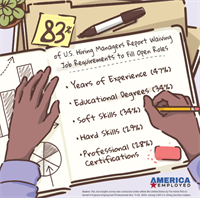Rethinking the Resume: 87% of Job Seekers Want Skills to Matter More Than Degrees
Forget the skills gap — job seekers say it’s a training gap. According to a recent Express Employment Professionals-Harris Poll survey, 79% of U.S. job seekers believe companies are passing over capable candidates because they’re unwilling to train them. And with 87% calling for skills-based hiring over degrees, many are pushing back on outdated job requirements that may be doing more harm than good.
While hiring managers continue to cite a widening skills gap, most job seekers disagree. Instead, they call on employers to be more realistic about qualifications and more willing to invest in training. And they’re not just voicing frustration, they’re ready to stay loyal to companies that meet them halfway.
Job seekers across all age groups agree that certain core skills are essential in today’s workforce. Communication, work ethic, problem-solving, accountability and general demeanor all rank highly in importance, with more than 80% of job seekers citing them as critical when applying for a position. Slightly fewer consider technical skills (71%) and cultural fit (69%) as top priorities, suggesting a greater emphasis on soft skills.
At the same time, a significant number of job seekers believe employers are setting unrealistic standards that overlook capable candidates. Many feel that companies should reconsider rigid qualification lists and focus instead on potential and willingness to learn:
- 79% of job seekers say the “skills gap” is less about a lack of ability and more about employers’ unwillingness to train.
- 87% believe companies should prioritize skills-based hiring over requiring formal degrees.
- 74% think employers should be willing to forgo some job requirements to find the right person.
Generational differences are also evident. Younger candidates, particularly Gen Z and millennials, are much more likely to believe that company requirements are too strict:
- 77% of millennials and 71% of Gen Z say requirements are too stringent, compared to 53% of Boomers/Seniors.
- Similarly, 71% of Gen Z, millennials, and Gen X wish companies would waive education requirements, while only 55% of Boomers/Seniors agree.
On the employer side, the tension is apparent. Nearly 7 in 10 hiring managers (69%) say the skills gap is wider than ever, even though 84% believe their company has the resources to close it. Still, many employers are beginning to adapt.
Eighty-three percent of hiring managers report their company has waived some job requirements to fill open roles, including:
- Years of experience (47%)
- Educational degrees (34%)
- Soft skills (34%)
- Hard skills (29%)
- Professional certifications (28%)
Furthermore, 60% say their company is willing to make exceptions to job requirements in some instances, and 69% are open to waiving degree requirements. However, challenges persist as 35% admit they don’t know how to assess certifications or online degrees, which may discourage their adoption.
“In today’s evolving labor market, adaptability is increasingly recognized as a critical asset by both employers and job seekers,” said Express CEO Bob Funk, Jr. “Many business leaders are finding that while priorities may differ, there’s common ground in practical strategies, such as flexible qualifications and onboarding programs focused on long-term growth. These approaches help bridge gaps in expectations while maintaining the high standards that drive sustainable success.”
Survey Methodology
The Job Insights survey was conducted online within the United States by The Harris Poll on behalf of Express Employment Professionals from Nov. 11 to 26, 2024, among 1,001 U.S. hiring decision-makers.
The Job Seeker Report was conducted online within the United States by The Harris Poll on behalf of Express Employment Professionals from Nov. 21 to Dec. 10, 2024, among 1,039 adults ages 18 and older.
For full survey methodologies, please contact Sheena.Hollander@ExpressPros.com, Director of Corporate Communications & PR.
###
Express Employment Professionals
-
Chris Kaske Manager
- May 28, 2025
- (517) 546-5627
- Send Email

